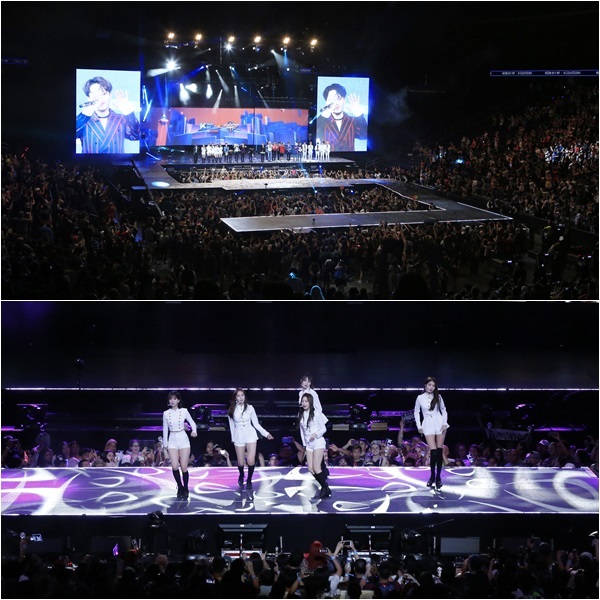Hallyu’s future; limitations and sustainability
Hallyu has been around for the past two decades, but how long will it last?
By Yoon Min-sikPublished : Aug. 14, 2017 - 17:30
In the 1990s, Korea’s popular culture begin to expand overseas, mostly to other Asian countries. It was during this time that the government begin emphasizing the potential of culture industry.
The term Hallyu (Korean wave), which was coined by the Chinese media in 2000 to describe the onslaught of Korean dramas and pop songs there, was quickly adopted by Korea too to refer to Korean entertainment content. Today, it is used to describe a gamut of content and products of Korean origin.
The term Hallyu (Korean wave), which was coined by the Chinese media in 2000 to describe the onslaught of Korean dramas and pop songs there, was quickly adopted by Korea too to refer to Korean entertainment content. Today, it is used to describe a gamut of content and products of Korean origin.

As Koreans reflect upon the past two decades of Hallyu, a question on people‘s minds is, how long will it last?
Pop culture exporter
Tracing back to the dawn of Hallyu, one unexpectedly encounters Steven Spielberg’s “Jurassic Park.”
A year after the 1993 film’s release, the presidential advisory committee reported to then-President Kim Young-sam that the movie had made about $850 million in one year, roughly equivalent to the profit earned by selling 1.5 million cars.
Shocked by such numbers, the committee concluded that promoting the culture industry could be the most proficient way to maximize profit.
Since then Korea has turned from a pop culture importer to an exporter.
According to Korea Creative Content Agency, the country exported roughly $5.66 billion worth of content and imported $1.18 billion worth of content last year.
In 2013, a Hollywood remake of director Park Chan-wook’s gruesome revenge thriller “Oldboy” was unveiled, with director Spike Lee at the helm. Smash hit drama “Guardian” was recently aired on Japanese TV, having reportedly been sold for over $200,000 per episode.
Millions of tourists visit Korea each year, a considerable number of them Hallyu fans.
Kanae Tanaka, 53, a tourist from Osaka, Japan, said she became fascinated with Korea after watching the 2002 drama “Winter Sonata,” and has visited the country nearly 50 times.
Even with China’s recent ban on Korean content, its popularity remains strong.
“Guardian,” although it was not officially exported to China, was searched more than 3.2 billion times on Weibo, Chinese social networking service.
“I was used to dealing with J-pop. It was a lot similar (to K-pop), but that was back in the day. Now I feel like K-pop is dominating Asia,” said Dutch DJ Ferry Corsten, one of the most prominent figures in the trance music scene.
Having worked with K-pop artists Amber and Luna, Corsten is planning to do more work with S.M. Entertainment artists later this year.
Cultural insensitivity
With Hallyu reaching a wider spectrum of fans, there has been concern over insensitivity to people of different cultures.
Such concern materialized last month in a depiction of the Islamic culture in the MBC drama “Man Who Dies to Live.”
In what was intended as a comical caricature, the creators depicted the Islamic tradition in a way that was inaccurate and offensive to some viewers.
“Depicting Islamic culture in a drama wasn’t wrong or needs apologizing. But depicting it wrongly is what offended the Muslims,” said one disgruntled reader of The Korea Herald.
“The drama is a classic case of a ‘Galapagos syndrome’ of Korean drama,” said Cho Won-hee, a culture critic and movie director.
As the producers are accustomed to making dramas for a mainly Korean audience, they would have been unaware of what may be offensive to people of other cultures, Cho pointed out.
Cho went on to say that the limitations of Hallyu does not stop at such accidental and unintended offensive depictions.
He raised doubts on whether diversifications of genres in Korean dramas will do well with foreign fans, who fell in love with romance-driven Hallyu dramas like “Winter Sonata.”
“More diverse dramas are popping up, most recently “Stranger” that was a big hit in Korea. ... I don’t think foreign fans fell in love with ‘these kinds of’ dramas,” he said.
“When you look at how Hallyu is depicted in countries like Malaysia, you can see what they think Hallyu is: a story mainly about a devoted couple expressing their love to each other.
“These kind of dramas have passed their prime in Korea. Korean fans will keep on searching for new types of dramas, while foreign fans will have different opinions. It will be hard to cater to both spectrum of fans,” he said.
Hallyu’s future
Last month, President Moon Jae-in said he plans to increase the number of Hallyu fans to 100 million in the next five years. The number of Hallyu fans today is estimated to be around 60 million.
However, local cultural figures said that such an approach derives from a lack of understanding on how pop culture works.
Writer Son A-ram told local media that focusing on already-established forms of pop culture would be like “fertilizing the fruit, instead of the root.”
“If everyone made the same content, diversification of culture takes a hit. You never know which underground artists may grow to create a multi-billion dollar market,” he said.
Director Cho said the best tactic for creating content that appeals to a foreign audience is to focus on each individual content, not treating it as part of an international phenomenon that is Hallyu.
“BTS is a good example. The boyband is not popular because it is Korean artists; it is popular because its music and concept appeal to the international audience. The same with Psy (in 2012),” he said.
By Yoon Min-sik
(minsikyoon@heraldcorp.com)







![[KH Explains] How should Korea adjust its trade defenses against Chinese EVs?](http://res.heraldm.com/phpwas/restmb_idxmake.php?idx=644&simg=/content/image/2024/04/15/20240415050562_0.jpg&u=20240415144419)











![[Today’s K-pop] Stray Kids to return soon: report](http://res.heraldm.com/phpwas/restmb_idxmake.php?idx=642&simg=/content/image/2024/04/16/20240416050713_0.jpg&u=)